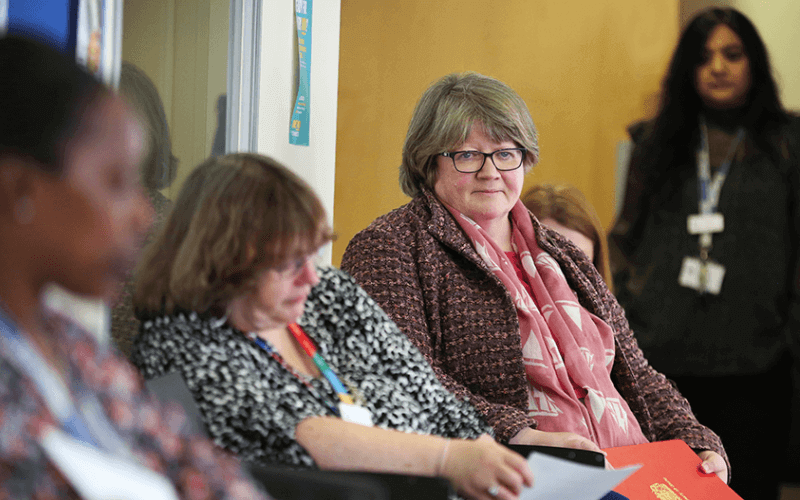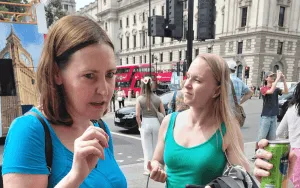Benefits for disabled people are set to rise by just 0.5 per cent next year, the government has announced, despite the increasing costs and cuts to support many of them are facing as a result of the pandemic.
The announcement by work and pensions secretary Therese Coffey means that someone in the work-related activity group of employment and support allowance (ESA) will receive a rise of just 37p a week from next April.
The same 0.5 per cent increase – in line with September’s inflation rate – will apply to personal independence payment and disability living allowance, but not state pensions, which will rise by 2.5 per cent.
The 0.5 per cent increase comes even though many disabled people have faced extra costs as a result of the pandemic, including having to switch to more expensive online food deliveries, and paying for personal protective equipment for personal assistants and care workers and extra cleaning products.
Coffey (pictured) also failed again to extend the £20 a week uplift given to claimants of universal credit – introduced as a temporary measure in the early weeks of the pandemic – to those on ESA, jobseeker’s allowance and income support.
A petition to extend the payments has so far been signed by nearly 120,000 people.
Fazilet Hadi, head of policy for Disability Rights UK (DR UK), said: “The failure to provide an uplift for two million people shows government’s flagrant disregard for disabled people.”
The Disability Benefits Consortium, whose members include the National Survivor User Network, Inclusion London and DR UK, said that granting disabled people an additional 37p a week “has left us lost for words”.
Coffey’s announcement came as the chancellor, Rishi Sunak, delivered a one-year spending review that provides an extra £55 billion for spending on public services to tackle coronavirus next year, while the prime minister, Boris Johnson, had earlier announced an extra £24 billion in spending on defence over the next four years.
The spending review also saw an announcement of extra funding for local councils, including a repeat of last year’s £1 billion grant for social care and an extra £300 million social care grant, while also allowing them to increase council tax bills by up to three per cent to fund adult social care.
The Association of Directors of Adult Social Care said of the funding settlement: “While we are still examining the detail, it seems as if the fragmented short-term funding announced by the chancellor falls alarmingly short.”
The spending review also confirmed that the publication of the government’s long-awaited and much-delayed plans for social care reform would be delayed again, until next year.
There are also likely to be concerns within the disabled people’s movement at the announcement of £300 million for capital spending on “new school places for children with special educational needs and disabilities”, which is “almost four times as much as the government provided to local authorities in 2020-21”.
This funding will pay for new segregated special schools, and some mainstream places, with the Treasury confirming to Disability News Service this morning (Thursday) that it was “capital funding specifically for new school places for children with special educational needs (both in mainstream and special schools)”.
It is not yet clear whether this is on top of the government’s announcement in 2019, and confirmed in July, that it was creating more than 3,000 places in 35 new special free schools across England. Those schools are expected to open from September 2022.
The plans were greeted last year with anger by inclusive education campaigners, who condemned plans for new segregated institutions in every part of England.
The original announcement came 18 months after the UN’s committee on the rights of persons with disabilities was highly critical of the UK government’s record on inclusive education.
When the committee published its “concluding observations” on the progress the UK had made in implementing the UN Convention on the Rights of Persons with Disabilities in August 2017, it criticised the UK government’s approach, and the “persistence of a dual education system” that segregates increasing numbers of disabled children in special schools.
The spending review also saw the government announce £573 million in spending on the disabled facilities grant – which funds adaptations to disabled people’s homes – a significant increase of £68 million (more than 13 per cent) on 2020-21, and a huge increase from the £220 million provided in 2015-16.
And it saw £71 million for the Care and Support Specialised Housing Fund – which funds new accessible supported and specialised housing – which appears to be a fall of £5 million on the previous year, although the Treasury was not able to confirm this by noon today (Thursday).
A note from the editor:
Please consider making a voluntary financial contribution to support the work of DNS and allow it to continue producing independent, carefully-researched news stories that focus on the lives and rights of disabled people and their user-led organisations.
Please do not contribute if you cannot afford to do so, and please note that DNS is not a charity. It is run and owned by disabled journalist John Pring and has been from its launch in April 2009.
Thank you for anything you can do to support the work of DNS…

 Disabled MP who quit government over benefit cuts tells DNS: ‘The consequences will be devastating’
Disabled MP who quit government over benefit cuts tells DNS: ‘The consequences will be devastating’ Minister finally admits that working-age benefits spending is stable, despite months of ‘spiralling’ claims
Minister finally admits that working-age benefits spending is stable, despite months of ‘spiralling’ claims Timms says cuts must go ahead, despite being reminded of risk that disabled claimants could die
Timms says cuts must go ahead, despite being reminded of risk that disabled claimants could die